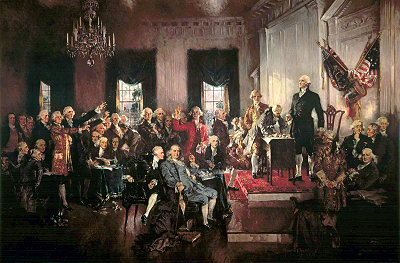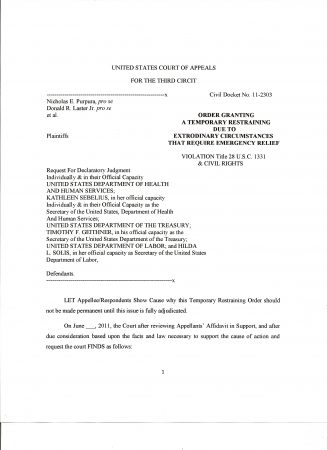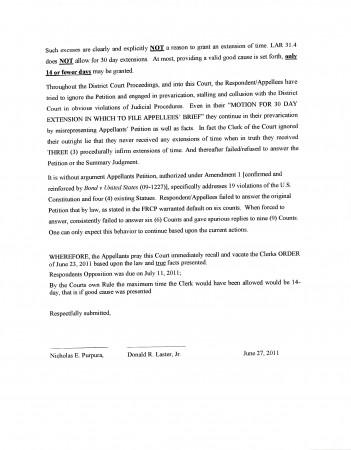WHICH JUDGE WILL HEAR THE CASE?
by Sharon Rondeau

(Jun. 30, 2011) — The Purpura v. Sebelius lawsuit was filed in September 2010 by Nicholas Purpura and Donald R. Laster Jr., who had requested the court to declare HR 3590, the Patient Protection and Affordable Care Act (PPACA) unconstitutional based on numerous violations of the U.S. Constitution as well as federal “anti-trust” and “Posse Comitatus” laws. The plaintiffs named the Department of Health and Human Services, the Department of the Treasury, and the Department of Labor as defendants.
On April 21, 2011, a U.S. District Court judge dismissed the case, stating that the plaintiffs did not have subject matter jurisdiction, quoting a previous decision of the U.S. Supreme Court regarding “standing” (page 7). However, the Supreme Court recently ruled that individuals and states have standing in regard to federal mandates which violate the Tenth Amendment to the U.S. Constitution and therefore the United States’ federalist form of government.
The Federalist Blog raises the question as to whether or not the states are the proper determiners of citizenship status and that birth on U.S. soil is likely not enough to render a person a “natural born Citizen.”
A person assisting Purpura and Laster with the lawsuit told The Post & Email:
A natural born Citizen is one who is created by other human beings. That’s where the language “parents” is coming in. It’s semantics. Human beings create natural born Citizens, not the government. The government creates naturalized citizens. That’s the difference. You can even forget about whether it’s both parents and the soil, and you can make the argument based on “Is it a natural born Citizen, one that is created by other human beings and not the government, or it a citizen who is created by the government, which is a naturalized citizen? Because a natural born Citizen is the opposite of a naturalized citizen. Article II says “natural born,” not naturalized. Obama is naturalized because he has a foreign father and he claims “soil” as his right to citizenship.
You can be naturalized if you’re born on the soil, or if you have a U.S. citizen mother and a foreign father. Then you can be automatically naturalized at birth. But that does not make you “natural born,” because “natural born” has nothing to do with man-made positive law. You have to inherit it, as a general rule, from parents because that’s where babies come from. But specifically, it’s only your father that matters. That’s exactly what Vattel says.
Vattel is not defining something in Section 212; the laws of nature define it. And although Vattel is stating a requirement, the requirement is not that you have both parents and born on the soil; the requirement is just that you have a citizen father and the place of birth doesn’t matter.
Some believe that there can’t be any conflict when you’re born. It’s not that there’s no conflict; it’s that there is no conflict in natural political allegiance. It’s that your natural political allegiance must be aligned with the United States. The artificial political allegiances don’t matter because they cannot conflict with your natural political allegiance, which is the controlling one. That’s the one that matters. If you have an American citizen father and you have a foreign mother, from the jurisdiction of the foreign mother – let’s say she’s Italian – from the Italians’ point of view, any children born to that mother have a foreign father. So they’re not natural born Citizens even in their own country. This is why the mother doesn’t matter; it’s the father.
Regarding the Purpura case, they haven’t even found a judge yet, so a clerk of the court ruled on the state motion where the state asks for an extension of 30 days. The reason they gave is that “they’re too busy.” So Nick looked it up and said, that “The law says that ‘being too busy’ isn’t a valid excuse.” Also, a clerk of the court is not authorized to give a 30-day extension; at most, he can give only a 14-day extension. So already, the clerk of the court has exceeded his authority by granting more time than the law allows, and he has also done it without showing a good cause because just saying you’re too busy is not good enough.
As a result, Nick filed the documents pictured below. One of the document is a temporary restraining order to prevent the government from implementing the health care bill until the matter is adjudicated. The next thing he asked for was a ruling to overturn what the clerk of the court has done and a show-cause hearing as to why these people are entitled to any extension of time, which they’re not. They need to show a valid reason. Nick also introduced the recent Bond case which shows that we have standing. A clerk of the court cannot rule on a temporary restraining order, nor can he rule on this issue that has now been created by the clerk, which is exceeding his authority. So this forces them to assign a judge.
The latest Supreme Court ruling changes everything. The government has nothing. You cannot be a natural born Citizen of the United States if you’re born to a foreign father; it’s just not possible. That argument alone is simple logic, showing the difference between natural law and positive law. Natural law is where the parents create the citizen; positive law is the opposite of natural law; that’s the government creating the citizen. Article II discusses the ones created by the parents, specifically the father. That’s all it means. It’s just that simple, and no one can argue against it. The government knows it.
In “The Law of Nations,” Section 212, Vattel states:
§ 212. Citizens and natives.
The citizens are the members of the civil society; bound to this society by certain duties, and subject to its authority, they equally participate in its advantages. The natives, or natural-born citizens, are those born in the country, of parents who are citizens. As the society cannot exist and perpetuate itself otherwise than by the children of the citizens, those children naturally follow the condition of their fathers, and succeed to all their rights. The society is supposed to desire this, in consequence of what it owes to its own preservation; and it is presumed, as matter of course, that each citizen, on entering into society, reserves to his children the right of becoming members of it. The country of the fathers is therefore that of the children; and these become true citizens merely by their tacit consent. We shall soon see whether, on their coming to the years of discretion, they may renounce their right, and what they owe to the society in which they were born. I say, that, in order to be of the country, it is necessary that a person be born of a father who is a citizen; for, if he is born there of a foreigner, it will be only the place of his birth, and not his country.
Vattel distinguishes between “natural born” citizens and “foreigners,” who become citizens of a country by virtue of that nation’s laws:
§ 213. Inhabitants.
The inhabitants, as distinguished from citizens, are foreigners, who are permitted to settle and stay in the country. Bound to the society by their residence, they are subject to the laws of the state while they reside in it; and they are obliged to defend it, because it grants them protection, though they do not participate in all the rights of citizens. They enjoy only the advantages which the law or custom gives them. The perpetual inhabitants are those who have received the right of perpetual residence. These are a kind of citizens of an inferior order, and are united to the society without participating in all its advantages. Their children follow the condition of their fathers; and, as the state has given to these the right of perpetual residence, their right passes to their posterity.
§ 214. Naturalization.(58)
A nation, or the sovereign who represents it, may grant to a foreigner the quality of citizen, by admitting him into the body of the political society. This is called naturalization. There are some states in which the sovereign cannot grant to a foreigner all the rights of citizens, — for example, that of holding public offices — and where, consequently, he has the power of granting only an imperfect naturalization. It is here a regulation of the fundamental law, which limits the power of the prince. In other states, as in England and Poland, the prince cannot naturalize a single person, without the concurrence of the nation, represented by its deputies. Finally, there are states, as, for instance, England, where the single circumstance of being born in the country naturalizes the children of a foreigner.
§ 215. Children of citizens born in a foreign country.
It is asked whether the children born of citizens in a foreign country are citizens? The laws have decided this question in several countries, and their regulations must be followed.(59) By the law of nature alone, children follow the condition of their fathers, and enter into all their rights (§ 212); the place of birth produces no change in this particular, and cannot, of itself, furnish any reason for taking from a child what nature has given him; I say “of itself,” for, civil or political laws may, for particular reasons, ordain otherwise. But I suppose that the father has not entirely quitted his country in order to settle elsewhere. If he has fixed his abode in a foreign country, he is become a member of another society, at least as a perpetual inhabitant; and his children will be members of it also.
The following two pages are the Temporary Restraining Order filed by Purpura and Laster:


The Temporary Restraining Order states in paragraph 2 of page 2:
Issuance of a temporary restraining order ex parte is clearly in the public’s interest and not against the public’s interest because the financial burdened [sic] the public is now and will continue to suffer as a whole if said relief is denied. Our Nation’s financial crisis outweighs any excuse Respondents can demonstrate as to why this Court should lift this Order. The Court notes Respondents by their previous pleading stated the “Act” doesn’t take effect until 2014.
And it concludes:
The Court will accept an opposing reply and thereafter set forth a hearing date for oral argument to lift this TRO should Appellee/Respondent’s [sic] request. Until such time and if Respondent’s [sic] can demonstrate Appellants are incorrect Appellee/Respondent’s officers, agents, servants, employees, attorneys, and all persons acting in concert with them be restrained from any further implementation of “H.R. 3590” “Patient Protection and Affordable Care” Act.
SO ORDERED.
There is then a signature line for a judge to sign.
The following three pages are the Motion to Vacate, which states that the order of court clerk Marcia M. Waldron granting a 30-day extension without due cause should be “immediately recalled and vacated” (first paragraph, page 1) under Rule 27 of the Federal Rules of Appellate Procedure.

Rule 27 (b) states:
(b) Disposition of a Motion for a Procedural Order.
The court may act on a motion for a procedural order—including a motion under Rule 26(b)—at any time without awaiting a response, and may, by rule or by order in a particular case, authorize its clerk to act on specified types of procedural motions. A party adversely affected by the court’s, or the clerk’s, action may file a motion to reconsider, vacate, or modify that action. Timely opposition filed after the motion is granted in whole or in part does not constitute a request to reconsider, vacate, or modify the disposition; a motion requesting that relief must be filed.
On page 2, Purpura and Laster quote from the Local Appellate Rules, Section 31.4, in their claim that the clerk exceeded her authority:
“31.4 Motions for Extension of Time to File a Brief
A party’s first request for an extension of time to file a brief must set forth good cause. Generalities, such as that the purpose of the motion is not for delay or that counsel is too busy, are not sufficient. A first request for an extension of 14 days or less may be made by telephone or in writing.…

The appellants state on page 3:
Throughout the District Court Proceedings, and into this Court, the Defendants/Appellees have tried to ignore the Petition and engaged in prevarication, stalling and collusion with the lower Court in obvious violations of Judicial Procedures. Even in their “MOTION FOR 30 DAY EXTENSION IN WHICH TO FILE APPELLEES’ BRIEF” they continue in their prevarication by misrepresenting contents of Appellants’ Petition.

A two-page letter to the U.S. Court of Appeals in the Third Circuit reiterates the appellants’ claims above, citing Rule 27(b) of the Federal Rules of Appellate Procedure and Rule 31.4 of the Local Appellate Rules.


The Post & Email has been told that several judges have recused themselves from hearing the appeal. At the time of this writing, to our knowledge, no judge has been assigned to the case.
